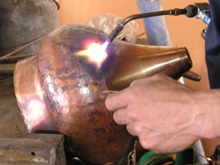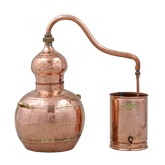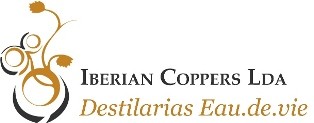Soldering or Welding

All our Al-Ambiq® pot stills are soldered with copper, brass, 100% lead-free tin or silver. Brass, 100% lead-free tin and silver solder is perfectly safe and is commonly used for soldering copper for food use. The main elements in solder that we need to avoid are cadmium and lead.
The first union of the pot (boiler) involves overlapping the sheets of copper, melting the two extremities, and then hammering this area on an anvil so that the copper may regain its molecular properties and strength. Copper becomes very flexible and limp at high temperatures.
The other sections of the pot are soldered with brass. Brass is an alloy of copper and zinc, well-known for its hardness and workability. Brass-soldered joints are also hammered on an anvil to strengthen them. All areas of the still that will sustain high temperatures are soldered with brass.
The joints of the still that are not exposed to such high temperatures, as in the pot (boiler) and where hammering is not possible, use 100% lead-free tin solder. Tin solder flows easily at a lower temperature, and there is no need to hammer the copper parts, as its molecular structure is not altered. Tin solder is used for the piping and to attach the thermometers. Tin adheres well to copper and is not very soluble, which is important because alcohol is a known solvent, and there may be hot alcohol vapors inside a still.
Cadmium-free silver solder is mostly tin with a small amount of silver. It requires higher temperatures to flow, but it also has excellent adhering properties. Silver solder is used to solder the brass handles and other specific areas of the stills. Whichever alloy has been employed in the soldering, our customers can be assured that it will not in any way alter the flavoring, coloring, or final results of the distillate.


